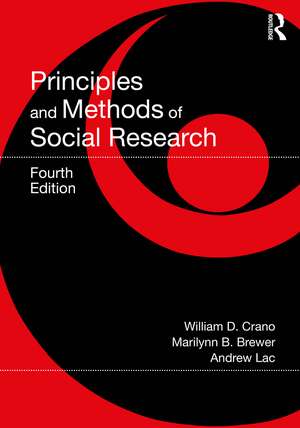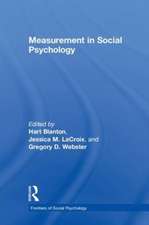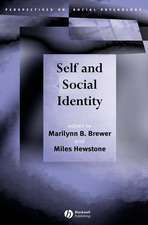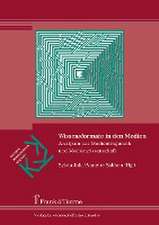Principles and Methods of Social Research
Autor William D. Crano, Marilynn B. Brewer, Andrew Lacen Limba Engleză Paperback – 11 iul 2023
Explained with updated applied examples useful to the social, behavioral, educational, and organizational sciences, the methods described are relevant to contemporary researchers. The underlying logic and mechanics of experimental, quasi-experimental, and non-experimental research strategies are discussed in detail. Introductory chapters cover topics such as validity and reliability furnish readers with a firm understanding of foundational concepts. The book has chapters dedicated to sampling, interviewing, questionnaire design, stimulus scaling, observational methods, content analysis, implicit measures, dyadic and group methods, and meta-analysis to cover these essential methodologies. Notable features include an emphasis on understanding the principles that govern the use of a method to facilitate the researcher’s choice of the best technique for a given situation; use of the laboratory experiment as a touchstone to describe and evaluate field experiments, correlational designs, quasi experiments, evaluation studies, and survey designs; and coverage of the ethics of social research including the power a researcher wields and tips on how to use it responsibly.
The new edition features:
- Increased attention to the distinction between conceptual replication and exact replication and how each contributes to cumulative science.
- Updated research examples that clarify the operation of various research design operations.
- More learning tools including more explanation of the basic concepts, more research examples, and more tables and figures, such as additional illustrations to include internet content like social media.
- Extensive revisions and expansions of all chapters.
- A fuller discussion of the dangers of unethical treatment to research participants.
| Toate formatele și edițiile | Preț | Express |
|---|---|---|
| Paperback (2) | 606.07 lei 3-5 săpt. | +71.94 lei 7-11 zile |
| Taylor & Francis – 11 iul 2023 | 606.07 lei 3-5 săpt. | +71.94 lei 7-11 zile |
| Taylor & Francis – 9 sep 2014 | 687.87 lei 6-8 săpt. | |
| Hardback (2) | 1021.38 lei 6-8 săpt. | |
| Taylor & Francis – 11 iul 2023 | 1021.38 lei 6-8 săpt. | |
| Taylor & Francis – 9 sep 2014 | 1239.39 lei 6-8 săpt. |
Preț: 606.07 lei
Preț vechi: 666.02 lei
-9% Nou
Puncte Express: 909
Preț estimativ în valută:
115.98€ • 118.78$ • 96.48£
115.98€ • 118.78$ • 96.48£
Carte disponibilă
Livrare economică 25 februarie-11 martie
Livrare express 11-15 februarie pentru 81.93 lei
Preluare comenzi: 021 569.72.76
Specificații
ISBN-13: 9781032222400
ISBN-10: 1032222409
Pagini: 486
Ilustrații: 36 Tables, black and white; 70 Line drawings, black and white; 70 Illustrations, black and white
Dimensiuni: 178 x 254 x 29 mm
Greutate: 1.92 kg
Ediția:4 ed
Editura: Taylor & Francis
Colecția Routledge
Locul publicării:Oxford, United Kingdom
ISBN-10: 1032222409
Pagini: 486
Ilustrații: 36 Tables, black and white; 70 Line drawings, black and white; 70 Illustrations, black and white
Dimensiuni: 178 x 254 x 29 mm
Greutate: 1.92 kg
Ediția:4 ed
Editura: Taylor & Francis
Colecția Routledge
Locul publicării:Oxford, United Kingdom
Public țintă
ProfessionalCuprins
Acknowledgements and Dedication
Preface
Part I
Introduction to Social Research Methods
Chapter 1. Basic Concepts
Science and Daily Life
From Theory, Concept, or Idea to Operation
Role of Theory in Scientific Inquiry
Conclusion and Overview
References
Chapter 2. Internal and External Validity
Causation
Distinguishing Internal and External Validity
Basic Issues of Internal Validity
Basic Issues of External Validity
Conclusion
References
Chapter 3. Measurement Reliability
Classical Measurement Theory
Contemporary Measurement Theory
Conclusion
References
Chapter 4. Measurement Validity
Types of Measurement Validity
The Multitrait-Multimethod Matrix
Threats to Measurement Validity
Conclusion
References
Part II.
Research Design Strategies: Experiments, Quasi-Experiments, and Nonexperiments
Chapter 5. Designing Experiments: Variations on the Basics
Basic Variations in Experimental Design
Expanding the Number of Experimental Treatments
Block Designs: Incorporating a Nonexperimental Factor
Repeated Measure Designs and Counterbalancing
Conclusion
References
Chapter 6. Constructing Laboratory Experiments
Steps for Constructing an Experiment
Types of Experimental Manipulations
Manipulation and Attention Checks
Assignment of Participants to Conditions: Randomization Procedures
Realism and Engagement in an Experiment
Role-Playing Simulations and Analogue Experiments
Conclusion
References
Chapter 7. External Validity of Laboratory Experiments
Generalizability Across Participants
Experimenter Expectancy and Bias
Three Faces of External Validity
Conclusion
References
Chapter 8. Conducting Experiments Outside the Laboratory
Research Settings and Issues of Validity
Constructing a Field Experiment
The Internet as a Site for Experimental Research
Conclusion
References
Chapter 9. Quasi-Experiments and Applied Research
Quasi-experimental Methods in Applied Contexts
Quasi-experimental Designs
The Use of Archival Data in Longitudinal Research
Conclusion
References
Chapter 10. Nonexperimental Research: Correlational Design
Bivariate Correlation and Regression
Multiple Regression
Using Regression to Test Mediation
Uses and Misuses of Correlational Analysis
Conclusion
References
Chapter 11. Advanced Multivariate Correlational Design
Multilevel Models
Structural Equation Models
Modeling Longitudinal Data
Conclusion
References
Part III
Data Collecting Methods
Chapter 12. Survey Studies: Design and Sampling
Selection vs. Assignment
Census and Survey Basics
Random Sampling
Nonrandom Sampling
Other Sampling Issues
Types of Survey Studies
Missing Data
Conclusion
References
Chapter 13. Systematic Observational Methods
Three Aspects of Naturalism
Observer Involvement in the Naturalistic Setting
Coding Observations
Conclusion
References
Chapter 14. Content Analysis
Content Analysis Basics
Conducting a Content Analysis
Summary of the General Paradigm
Representative Examples
Conclusion
References
Chapter 15. Interviewing
Modes of Administration
Developing the Interview
Conducting the Interview
Group Interviews and Focus Groups
Conclusion
References
Chapter 16. Construction of Questionnaires and Rating Scales
Questionnaires
Constructing Rating Scales
Conclusion
References
Chapter 17. Scaling Stimuli: Social Psychophysics
Scaling Stimuli
Stimulus Scaling Techniques
Multidimensional Scaling Models
Conclusion
References
Chapter 18. Indirect and Implicit Measures of Cognition and Affect
Indirect Measures
Information Processing: Attention and Memory
Priming: Processing Without Awareness or Intent
Social Psychophysiology
Conclusion
References
Chapter 19. Methods for Assessing Dyads and Groups
Dyadic Designs
Designs to Study Group Structures
Designs to Study Multiple Groups
Measuring Group Process and Outcomes
Conclusion
References
Part IV
Concluding Perspectives
Chapter 20. Synthesizing Research Results: Meta-Analysis
Replicability of Findings
Meta-Analysis
Stages in the Meta-Analysis Process
Interpreting the Meta-Analysis
Conclusion
References
Chapter 21. Social Responsibility and Ethics in Social Research
Ethics of Research Practices
The Regulatory Context of Research Involving Human Participants
Ethics of Data Reporting
Ethical Issues Related to the Products of Scientific Research
Conclusion
References
Glossary
Preface
Part I
Introduction to Social Research Methods
Chapter 1. Basic Concepts
Science and Daily Life
From Theory, Concept, or Idea to Operation
Role of Theory in Scientific Inquiry
Conclusion and Overview
References
Chapter 2. Internal and External Validity
Causation
Distinguishing Internal and External Validity
Basic Issues of Internal Validity
Basic Issues of External Validity
Conclusion
References
Chapter 3. Measurement Reliability
Classical Measurement Theory
Contemporary Measurement Theory
Conclusion
References
Chapter 4. Measurement Validity
Types of Measurement Validity
The Multitrait-Multimethod Matrix
Threats to Measurement Validity
Conclusion
References
Part II.
Research Design Strategies: Experiments, Quasi-Experiments, and Nonexperiments
Chapter 5. Designing Experiments: Variations on the Basics
Basic Variations in Experimental Design
Expanding the Number of Experimental Treatments
Block Designs: Incorporating a Nonexperimental Factor
Repeated Measure Designs and Counterbalancing
Conclusion
References
Chapter 6. Constructing Laboratory Experiments
Steps for Constructing an Experiment
Types of Experimental Manipulations
Manipulation and Attention Checks
Assignment of Participants to Conditions: Randomization Procedures
Realism and Engagement in an Experiment
Role-Playing Simulations and Analogue Experiments
Conclusion
References
Chapter 7. External Validity of Laboratory Experiments
Generalizability Across Participants
Experimenter Expectancy and Bias
Three Faces of External Validity
Conclusion
References
Chapter 8. Conducting Experiments Outside the Laboratory
Research Settings and Issues of Validity
Constructing a Field Experiment
The Internet as a Site for Experimental Research
Conclusion
References
Chapter 9. Quasi-Experiments and Applied Research
Quasi-experimental Methods in Applied Contexts
Quasi-experimental Designs
The Use of Archival Data in Longitudinal Research
Conclusion
References
Chapter 10. Nonexperimental Research: Correlational Design
Bivariate Correlation and Regression
Multiple Regression
Using Regression to Test Mediation
Uses and Misuses of Correlational Analysis
Conclusion
References
Chapter 11. Advanced Multivariate Correlational Design
Multilevel Models
Structural Equation Models
Modeling Longitudinal Data
Conclusion
References
Part III
Data Collecting Methods
Chapter 12. Survey Studies: Design and Sampling
Selection vs. Assignment
Census and Survey Basics
Random Sampling
Nonrandom Sampling
Other Sampling Issues
Types of Survey Studies
Missing Data
Conclusion
References
Chapter 13. Systematic Observational Methods
Three Aspects of Naturalism
Observer Involvement in the Naturalistic Setting
Coding Observations
Conclusion
References
Chapter 14. Content Analysis
Content Analysis Basics
Conducting a Content Analysis
Summary of the General Paradigm
Representative Examples
Conclusion
References
Chapter 15. Interviewing
Modes of Administration
Developing the Interview
Conducting the Interview
Group Interviews and Focus Groups
Conclusion
References
Chapter 16. Construction of Questionnaires and Rating Scales
Questionnaires
Constructing Rating Scales
Conclusion
References
Chapter 17. Scaling Stimuli: Social Psychophysics
Scaling Stimuli
Stimulus Scaling Techniques
Multidimensional Scaling Models
Conclusion
References
Chapter 18. Indirect and Implicit Measures of Cognition and Affect
Indirect Measures
Information Processing: Attention and Memory
Priming: Processing Without Awareness or Intent
Social Psychophysiology
Conclusion
References
Chapter 19. Methods for Assessing Dyads and Groups
Dyadic Designs
Designs to Study Group Structures
Designs to Study Multiple Groups
Measuring Group Process and Outcomes
Conclusion
References
Part IV
Concluding Perspectives
Chapter 20. Synthesizing Research Results: Meta-Analysis
Replicability of Findings
Meta-Analysis
Stages in the Meta-Analysis Process
Interpreting the Meta-Analysis
Conclusion
References
Chapter 21. Social Responsibility and Ethics in Social Research
Ethics of Research Practices
The Regulatory Context of Research Involving Human Participants
Ethics of Data Reporting
Ethical Issues Related to the Products of Scientific Research
Conclusion
References
Glossary
Notă biografică
William D. Crano is the Oskamp Distinguished Chair of Psychology and Director of the Health Psychology and Prevention Science Institute at Claremont Graduate University.
Marilynn B. Brewer is Professor Emeritus, Ohio State University.
Andrew Lac is an Associate Professor of Psychology at the University of Colorado Colorado Springs.
Marilynn B. Brewer is Professor Emeritus, Ohio State University.
Andrew Lac is an Associate Professor of Psychology at the University of Colorado Colorado Springs.
Descriere
Through a multi-methodology approach, this volume covers the latest research techniques and designs and guides readers toward the design and conduct of social research from the ground up. Applauded for its comprehensive coverage, the breadth and depth of content of this new edition is unparalleled.
Recenzii
"A classic resource continues to improve! Sophisticated theoretical and methodological grounding, but accessible to the beginning researcher. …A great discussion of indirect and implicit measures. .... A must-have resource for any advanced undergraduate or graduate course in research methods." – Duane T. Wegener, Ohio State University, USA
"This outstanding textbook blends the Donald Campbell tradition of adhering to fundamental concepts of validity, with new research practices. This is the textbook of choice for the newcomer who seeks clear explanations regarding basic and applied issues, as well as the seasoned researcher who seeks a comprehensive reference book." – Ximena Arriaga, Purdue University, USA
"The book presents complex ideas in a manner that is accessible to undergraduates while retaining the nuance necessary for graduate coursework. Both classic and contemporary content that is expressed with verve and precision." – James P. Dillard, Pennsylvania State University, USA
"This book offers a comprehensive yet accessible look at research methods. I read an early edition years ago and it had a profound influence on my career. It’s even better now. A must-read for Ph.D. students in the social sciences -- social psychology in particular! "— Zakary Tormala, Stanford University, USA
"The depth of understanding in research methodology provided in this book is second to none. I used this book as a graduate student, and when I started teaching graduate students I found that no other text provided the amount of detail required at the graduate level. ... I [am] using this text in Basic and Applied Research Methods …a graduate course for students in our counseling psychology MA program." – Joseph A. Camilleri, Westfield State University, USA
"I have been using this book as my primary text for Research Methods …a first-year graduate…course for our Clinical, Developmental and Psychometrics programs. I have been very happy with the book. …The proposed changes will make for an even stronger book. …My students like the book and find it accessible yet informative. …The book has a great balance between coverage and depth and serves my purposes well for an introductory graduate Research methods course in Psychology." – Tiffany Yip, Fordham University, USA
"The book is a perfect fit for my interests given my training in experimental social psychology and academic appointment in communication. ... The research examples in the book are about topics that interest my students and me. …[This is] is the only research methods textbook that meets my interests for the beginning graduate level." – Gwen M. Wittenbaum, Michigan State University, USA
"I feel positively about the proposed changes. ... These changes will make the book a better teaching tool. ... This book can be used for a graduate level research proposal or methods class. ...This book will definitely fit psychology, human development, and education graduate programs." – Wen-Pin Chang, Creighton University, USA
"This outstanding textbook blends the Donald Campbell tradition of adhering to fundamental concepts of validity, with new research practices. This is the textbook of choice for the newcomer who seeks clear explanations regarding basic and applied issues, as well as the seasoned researcher who seeks a comprehensive reference book." – Ximena Arriaga, Purdue University, USA
"The book presents complex ideas in a manner that is accessible to undergraduates while retaining the nuance necessary for graduate coursework. Both classic and contemporary content that is expressed with verve and precision." – James P. Dillard, Pennsylvania State University, USA
"This book offers a comprehensive yet accessible look at research methods. I read an early edition years ago and it had a profound influence on my career. It’s even better now. A must-read for Ph.D. students in the social sciences -- social psychology in particular! "— Zakary Tormala, Stanford University, USA
"The depth of understanding in research methodology provided in this book is second to none. I used this book as a graduate student, and when I started teaching graduate students I found that no other text provided the amount of detail required at the graduate level. ... I [am] using this text in Basic and Applied Research Methods …a graduate course for students in our counseling psychology MA program." – Joseph A. Camilleri, Westfield State University, USA
"I have been using this book as my primary text for Research Methods …a first-year graduate…course for our Clinical, Developmental and Psychometrics programs. I have been very happy with the book. …The proposed changes will make for an even stronger book. …My students like the book and find it accessible yet informative. …The book has a great balance between coverage and depth and serves my purposes well for an introductory graduate Research methods course in Psychology." – Tiffany Yip, Fordham University, USA
"The book is a perfect fit for my interests given my training in experimental social psychology and academic appointment in communication. ... The research examples in the book are about topics that interest my students and me. …[This is] is the only research methods textbook that meets my interests for the beginning graduate level." – Gwen M. Wittenbaum, Michigan State University, USA
"I feel positively about the proposed changes. ... These changes will make the book a better teaching tool. ... This book can be used for a graduate level research proposal or methods class. ...This book will definitely fit psychology, human development, and education graduate programs." – Wen-Pin Chang, Creighton University, USA
























